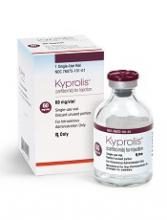Top-line results from the phase 3 A.R.R.O.W. trial support a 70 mg/m2 weekly dose of carfilzomib in combination with dexamethasone for patients with relapsed and refractory multiple myeloma (MM).
The data suggest a weekly dose of carfilzomib at 70 mg/m2 is more effective than, and just as safe as, a twice-weekly dose of carfilzomib at 27 mg/m2.
These results were recently announced by Amgen, makers of carfilzomib.
The A.R.R.O.W. trial included 478 patients with relapsed and refractory MM who had received 2 to 3 prior therapies, including bortezomib and an immunomodulatory drug.
Patients were randomized to receive once-weekly carfilzomib (20 mg/m2 on day 1 of cycle 1; 70 mg/m2 on days 8 and 15 of cycle 1; and 70 mg/m2 on days 1, 8 and 15 of subsequent cycles) with dexamethasone (40 mg) or twice-weekly carfilzomib (20 mg/m2 on days 1 and 2 of cycle 1; 27 mg/m2 on days 8, 9, 15 and 16 of cycle 1; and 27 mg/m2 on days 1, 2, 8, 9, 15 and 16 of subsequent cycles) with dexamethasone (40 mg).
The study’s primary endpoint is progression-free survival (PFS).
Patients treated with the once-weekly regimen had significantly better PFS than patients who received carfilzomib twice weekly. The median PFS was 11.2 months and 7.6 months, respectively (hazard ratio=0.69, 95% confidence interval, 0.54–0.88).
The overall safety profile of the once-weekly regimen was comparable to that of the twice-weekly regimen.
The most frequently reported treatment-emergent adverse events (occurring in at least 20% of patients) in either treatment arm were anemia, diarrhea, fatigue, hypertension, insomnia, and pyrexia.


